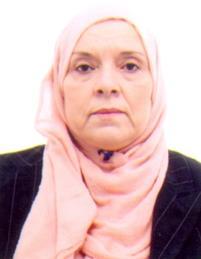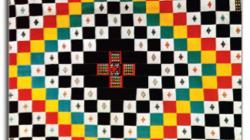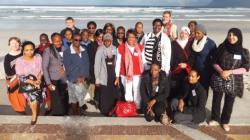
"My dream is to create new jobs interacting with mathematics not just teaching and research"
Education
- 1979 : Baccalaureate Mathematics
- 1983: DES in Functional Analysis, University of Annaba
- 1985 : Master in Mathematical Modeling and Numerical Analysis, University of Oxford
- 1988 : Phd in Applied Mathematics, Oxford & Strathclyde University.
Professional experience
- Lecturer, Badji Mokhtar university, 1989-1994
- Senior Lecturer, Badji Mokhtar university, 1994-1999
- Professor, Badji Mokhtar university, 2000-Present
- Visiting Professor, King Saud University-SA, 2002-2004
- Short time visiting professor:
- IRISA-Rennes-France (1994, 2004), Paris 6, University-France (2006-2015),
- Imperial college-UK in 2009, Keele University-UK in 2012 and 2013,
- Strathclyde university-UK (2015,2017), Oxford University-UK (2011, 2016).
Honours and prizes
Algerian Grant for the National best students selection in mathematics,1983.
Questionnaire
Your story with mathematics
Can you tell us something about your story? Why did you join the field of Mathematics?
I loved mathematics since I was a child. To me it has always been the subject that makes me think objectively in a logic manner.
What fascinates you about Mathematics? Its interaction with other fields without contradictions. Has anyone supported you in your choice and during your career?
My family was just proud of me being always succeful in my studies. However doing mathematics was not much for them (they would have liked me to be a medical doctor). Another aspect is that we were only three girls in the mathematics section in high school, and the only one girl for the PhD grant at that time.
Were there any specific factors that helped you succeed? What challenges did you encounter on the way?
Just my nature being a hard working and a determinant person. The challenge is that a woman can do anything and even better that a man.
What is the funniest or most memorable thing that has happened to you while working in mathematics?
The most memorable is solving real problems: finding real solution for medical sciences, industry and engineering that contribute in predicting and solving socio-economic problems.
Career and Family
Do you have kids? Tell us about balancing family life with work life?
I have three kids and I manage well my private life, I cannot say it is easy but being well organised helps a lot!!
Women and Mathematics
What were the biggest obstacles you had to overcome? Were you able to overcome these? Do you have anything else that you’d like to tell us about?
Taking positions was quite hard for a woman but not anymore now days!
Did you encounter any specific difficulties relating to the field of mathematics?
No good students in maths and no motivation for them. I keep trying to find good applications to interest them.
Tell us about the organizations for women mathematicians that you are a part of?
We are just starting with AWMA.
Teaching mathematics, especially to non-mathematicians, can be a challenge. What is your strategy to catch and keep the attention of your audience?
Try to be very pedagogic and find a way to make things easier not complicated. Mathematics is the subject that is too symbolised and this can be confusing for non mathematicians.
How would you explain your research to a layman (non-specialist)?
You cannot escape mathematics in any subject whether by using calculus, statistics and now days the big step towards mathematical modelling and numerical resolution of any problem.
Can you tell us about the applications of your research, if any?
- Medical sciences: Models that helped in tumour evolution 2009 (Saint Anne's Hospital-UK, Cadiology), Keele University-UK 2012 (Orthopedy, Stem Cell)
- Industry: by image processing we helped to detect manufacturing defect 2013 (Arcelor-Metal, Algeria)
- pharmacology: we put up a model for a bispecific antibody 2016 (AstraZeneca-UK)
- Sciences of plant: a model to help in agriculture of Maise 2016 (Birmingham-UK).
Conclusion
What are your biggest achievements, and what your biggest failures?
A biggest achievement is working in plural-disciplinary groups. My oldest son as a pharmacist is doing lots of advanced mathematical modelling in pharmacology. The only failure is not having good devoted students.
Do you have a dream? Any particular problem you dream to solve now?
My dream is to create new jobs interacting with mathematics not just teaching and research. Since 2013, I am leading a master degree in Differential equations and Scientific computing, where our students take different subjects such as image processing with mathematics tools and multiphase problems; I noticed that many are interested in our students.
Which advice would you give to young girls who want to engage a career in mathematics?
If you are devoted to mathematics go ahead there are lots of applications in real world.






